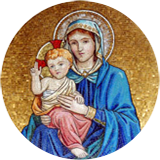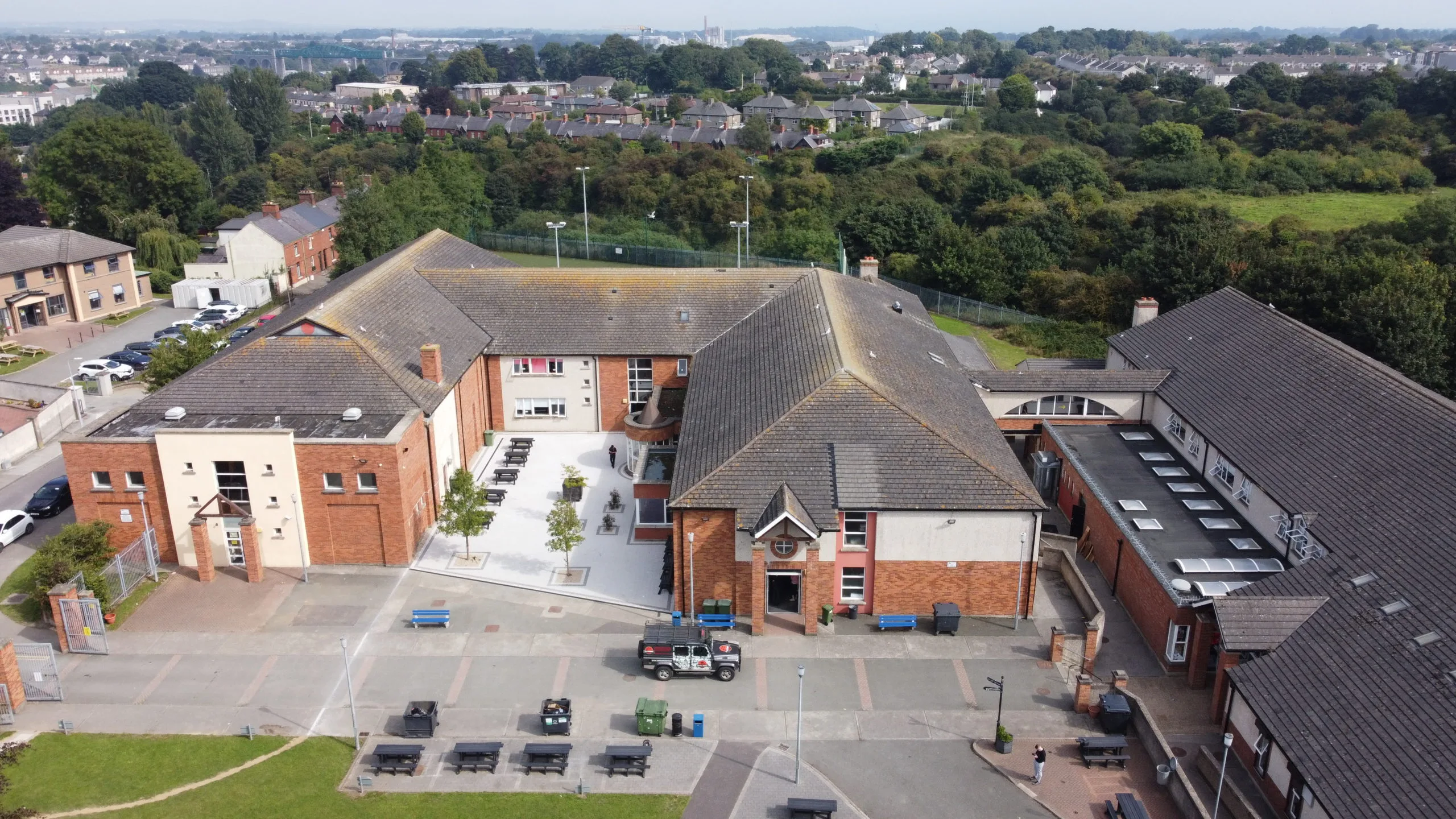Mass Readings
Liturgical Readings for : Thursday, 3rd July, 2025Léachtaí Gaeilge
Next Sunday’s Readings
3/7 Feast of St Thomas, Apostle
Thomas, the apostle, is said to have travelled widely even to India spreading the Good News of Jesus
C/f A short life of this saint can be found below todays’ Readings and Reflection.
FIRST READING
A reading from the letter of St Paul to the Ephesians 2:19-22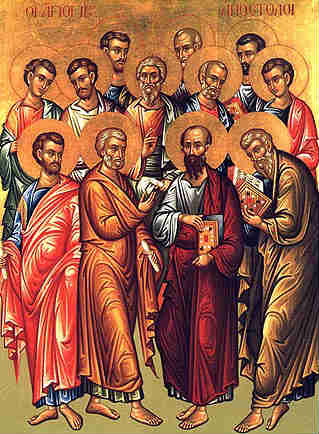
You are part of a building that has the apostles and prophets for its foundations.
You are no longer aliens or foreign visitors: you are citizens like all the saints, and part of God’s household. You are part of a building that has the apostles and prophets for its foundations, and Christ Jesus himself for its main cornerstone. As every structure is aligned on him, all grow into one holy temple in the Lord; and you too, in him, are being built into a house where God lives, in the Spirit.
The Word of the Lord. Thanks be to God
Responsorial Psalm Ps 116: Mk 16:15
Response Go out to the whole world; proclaim the Good News.
1. O praise the Lord, all you nations, acclaim him all you peoples! Response
2. Strong is his love for us; he is faithful for ever. Response
Gospel Acclamation Jn 20: 29
Alleluia, alleluia!
You believe, Thomas, because you can see me, says the Lord.
Happy are those who have not seen and yet believe.
Alleluia!
GOSPEL
The Lord be with you And with your spirit.
A reading from the holy Gospel according to John 20:24-29 Glory to you, O Lord.
My Lord and my God!
Thomas, called the Twin, who was one of the Twelve, was not with them when Jesus came.
When the disciples said, ‘We have seen the Lord’,
He answered,
‘Unless I see the holes that the nails made in his hands and can put my finger into the holes they made, and unless I can put my hand into his side, I refuse to believe.’
Eight days later the disciples were in the house again and Thomas was with them.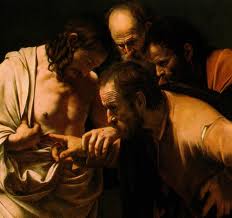
The doors were closed, but Jesus came in and stood among them.
‘Peace be with you‘ he said.
Then he spoke to Thomas,
‘Put your finger here; look, here are my hands. Give me your hand; put it into my side. Doubt no longer but believe.’
Thomas replied, ‘My Lord and my God!’
Jesus said to them:
‘You believe because you can see me. Happy are those who have not seen and yet believe.’
The Gospel of the Lord. Praise to you, Lord Jesus Christ.
Gospel Reflection Tuesday Saint Thomas John 20:24-29
In many ways, Thomas is the representative of us all. When the disciples were full of Easter joy on that Easter evening, declaring to Thomas, ‘We have seen the Lord’, he couldn’t bring himself to believe their good news. He had been devastated once by the crucifixion of Jesus; he wasn’t going to have his hopes dashed so cruelly again by wishful thinking. Unless very clear conditions were met, Thomas defiantly declares, ‘I refuse to believe’. Thomas’ doubts speak to our own doubts. There is always some element of doubt in our faith, because, as Saint Paul says in one of his letters, ‘now we see as in a mirror dimly, then we will see face to face’ (1 Cor 13:12). It is only in eternity that we will see the Lord face to face.
In this life our seeing the Lord with the eyes of faith will always be a seeing dimly. Thomas was on a journey towards Easter faith, but he was travelling that journey at a slower pace than the other disciples. Everyone’s journey towards a deeper, fuller, faith is unique to them. When the risen Lord appeared to the disciples a week later, this time with Thomas present, there was no rebuke of Thomas for his refusal to believe the message of the other disciples. There was the same greeting from the Lord, ‘Peace by with you’, and an invitation to Thomas to doubt no longer but believe. The Lord always meets us where we are; he comes to us, as we are. Then, in response to the Lord’s greeting, out of the mouth of the sceptic came one of the greatest confessions of faith in all four gospels, ‘My Lord and my God’. Scepticism and deep faith can often be found in one and the same person. On this feast of Saint Thomas, we are invited to make Thomas’ confession of faith our own, wherever we happen to find ourselves on our faith journey.
________________________________
The Scripture Readings are taken from The Jerusalem Bible, published 1966 by Darton, Longman & Todd Ltd. and used with the permission of the publishers. http://dltbooks.com/
The Scripture Reflection is made available with our thanks from his book Reflections on the Weekday Readings 2024: The Word is near to you, on your lips and in your heart by Martin Hogan and published by Messenger Publications c/f www.messenger.ie/bookshop/
________________
Saint of the Day: July 3, St Thomas, the apostle
“Doubting Thomas” has become a much-used phrase in many languages. It recalls the apostle’s disbelief on hearing that Jesus was risen from the dead and his need/desire for proof – and how he got it!
Patrick Duffy explores some perspectives on this endearing apostle.
A Literary “fall guy“
In John’s gospel, Thomas (called the Twin) appears as a mildly combative character with a wry sense of humour.
When Jesus explains that Lazarus is dead, and then goes on to say, “Let us go to him”, Thomas exclaimed, “Let us all go with the Teacher so that we may die with him!” (Jn 11:16).
Again, during the discourse at the Last Supper, when Jesus says, “You know the way that leads to the place where I am going,” Thomas points out, “Lord, we do not know where you are going; so how can we know the way to get there?”
Jesus brings the discourse to a new level when he says: “I am the way, the truth and the life” (Jn 14:4-6). In each of these incidents Thomas is used by the evangelist as a literary “fall guy” who ironically brings about a fuller understanding of who Jesus really is.
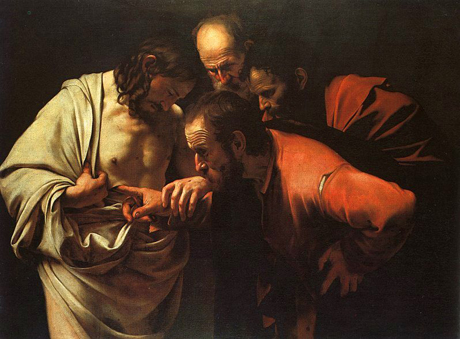
Thomas is best known for this role in verifying the resurrection of his Master. His resistance to believing that the other apostles had seen their risen Lord on the first Easter Sunday merited for him the title of “Doubting Thomas“.
Eight days later, on Christ’s second apparition, Thomas was gently rebuked for his scepticism and furnished with the evidence he had demanded – seeing in Christ’s hands the point of the nails and putting his fingers in the place of the nails and his hand into His side.
‘My Lord and My God!’
At this, St. Thomas became convinced of the truth of the Resurrection and exclaimed: ‘My Lord and My God,‘ thus making a public profession of faith in the divinity of Jesus. St. Thomas is also mentioned as being present at another resurrection appearance of Jesus – at Lake Tiberias when a miraculous catch of fish occurred. This is what we know about St. Thomas from the New Testament.
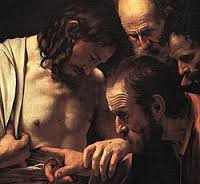
Caravaggio’s masterly oil on canvas painting of the drama of the disbelief of St Thomas, painted in 1600, is in the Cerasi Chapel, Santa Maria del Popolo, in Rome (see image right). This depiction of Thomas is physically quite shocking and the scene must have touched Caravaggio deeply. It pushes curiosity to its limits.
Four heads unite in the quest for truth before Thomas can say, ‘My Lord and my God.’ Christ’s head is largely in shadow, as He is the person who is the least knowable. He also has a serene beauty that is lacking in the frowning faces of the apostles.
The shocking image of the finger exploring the depths of the lance wound is softened slightly by the guiding hand of Christ, which seems to push Thomas’ finger deep into the wound. It is the supreme proof that Jesus is God.
In 384 AD Thomas relics were bought to Edessa in Syria where Thomas is venerated in the Catholic and Orthodox churches
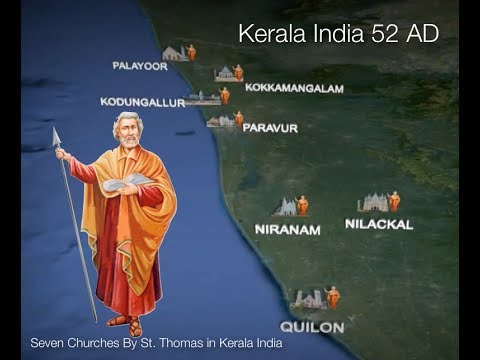
Tradition holds that when the apostles scattered after Pentecost, Thomas went to evangelise the Parthians, Medes, and Persians (Eusebius) and that he ultimately reached India, bringing the faith to the Malabar coast, which still boasts a large native population calling themselves “Christians of St. Thomas.” Marco Polo reported that both Christians and Saracens went on pilgrimage to his tomb and when the Portuguese first landed in India in 1498 they found established Christian communities there.
Three Apocrypha
Three apocryphal (that is non-canonical) gospels use the name of Thomas.
The ‘Acts of Thomas’ tell stories about his going to India and about his life there.
The ‘Gospel of Thomas’ has some saying of Jesus as well as miracles.
The ‘Infancy Gospel of Thomas’ tells of some miracles worked by Jesus as a child.
Patronage
Thomas is patron of blind people, probably because of his own spiritual blindness. A story from the Acts of Thomas that he built a palace for a local king in India led to his being named patron of builders, of architects and quantity surveyors.
____________________________
******************************
Memorable Saying for Today
Almost all the progress ever made in human thought has been made by Doubting Thomas’s,
‘the questioners, the challengers, the show-me crowd.’
~ Dale Carnegie ~
******************************
